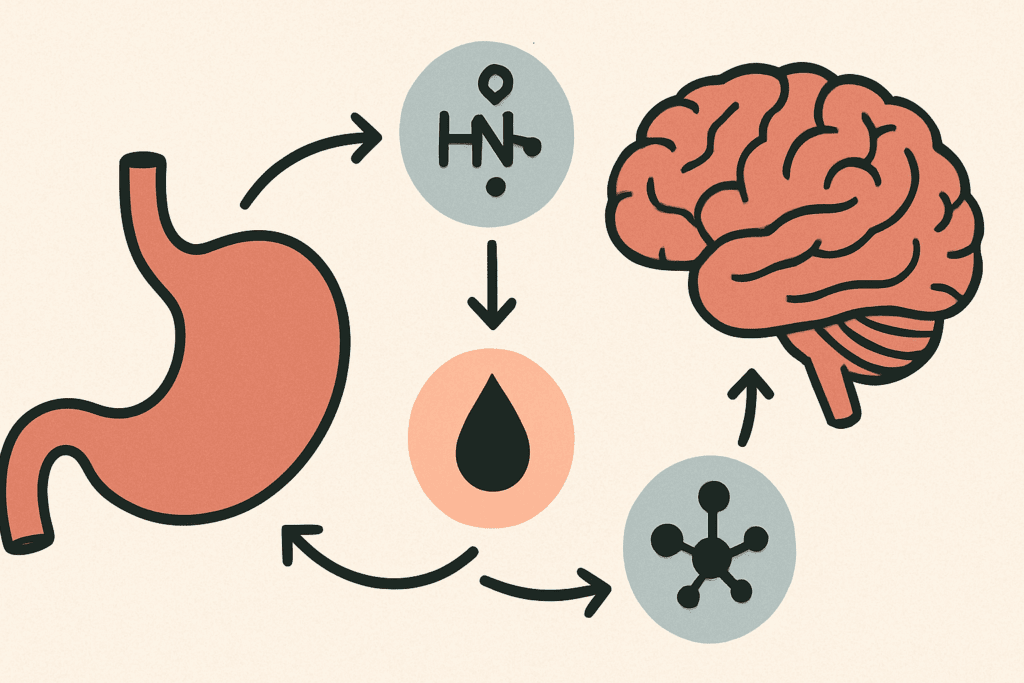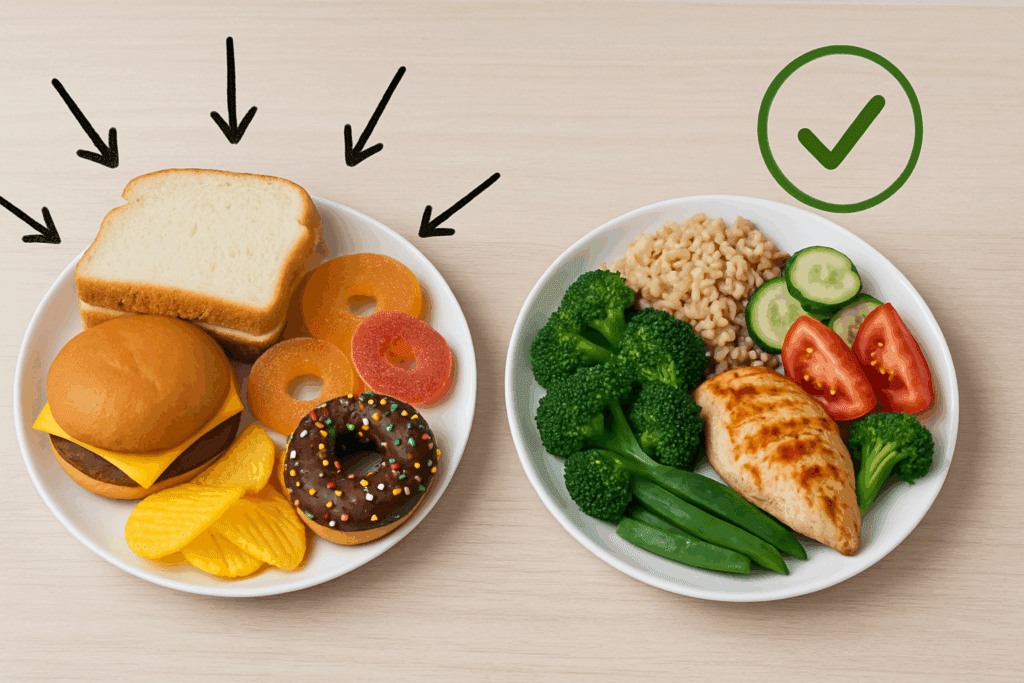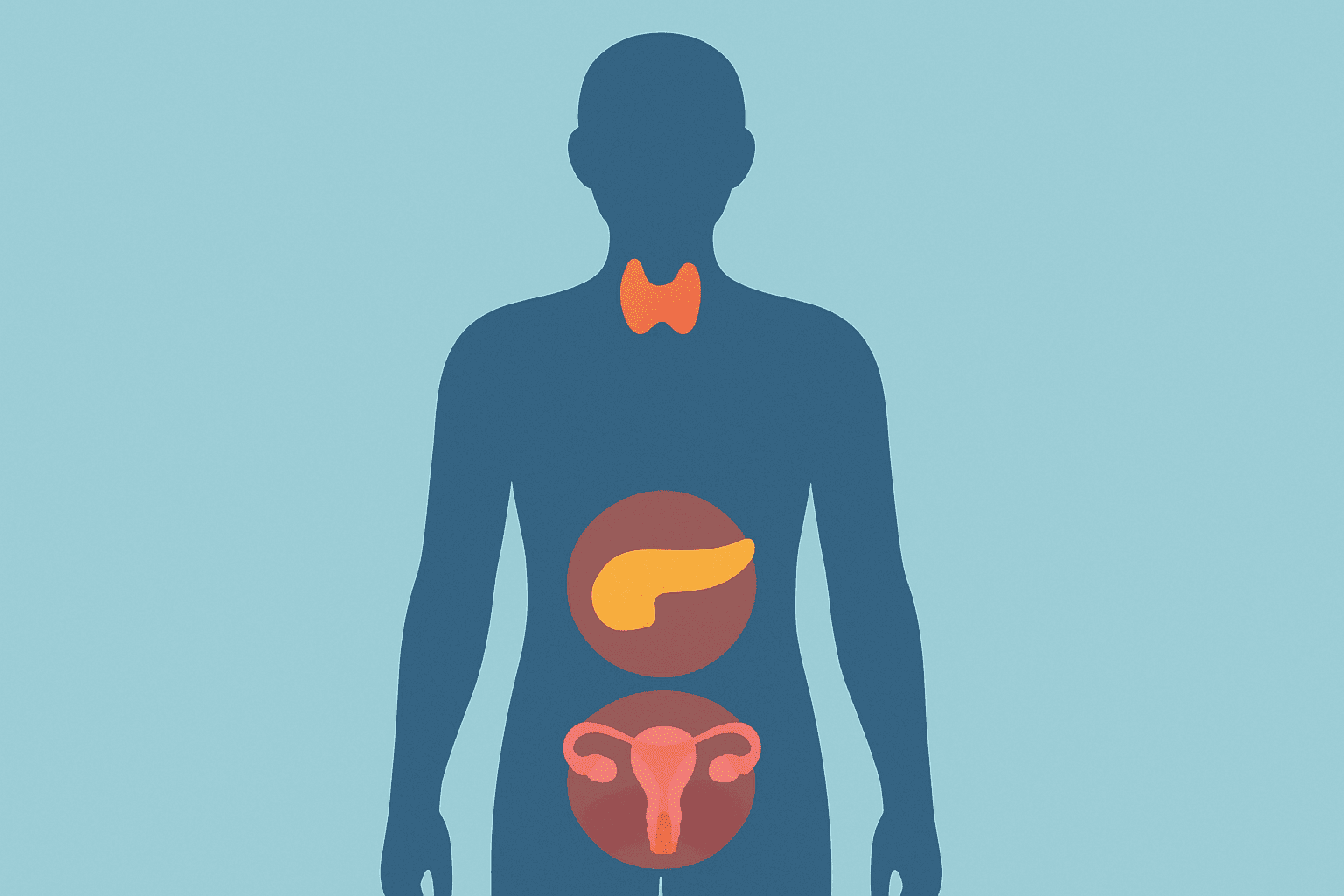Hunger is a natural biological response, a signal from the body that it needs nourishment. Yet, for many people, the sensation of being hungry doesn’t always align with physical necessity. If you find yourself wondering, “Why am I always hungry?” or feeling constantly hungry after eating, you’re far from alone. This persistent hunger can feel confusing, frustrating, and even concerning. Whether it’s a sudden increase in appetite or an ongoing cycle of never feeling satisfied, understanding the underlying causes of constant hunger is the first step toward managing it effectively.
You may also like: How to Stop Emotional Eating and Regain Control: Mindful Nutrition Strategies That Support a Healthier Lifestyle
From hormonal imbalances to emotional stress, dietary patterns to underlying health conditions, there are numerous reasons why someone might ask, “Why am I so hungry all the time?” For women, in particular, sudden increases in appetite may be influenced by hormonal fluctuations, which can make some feel suddenly hungry all the time. Recognizing the difference between physical hunger and emotional or psychological hunger is essential, as is understanding the impact of modern eating habits on our ability to recognize satiety. In this article, we’ll explore why people experience constant hunger, what makes you hungrier than you’re supposed to be, and how mindful eating can help you feel more in control of your appetite and your health.

The Science Behind Hunger: How the Body Regulates Appetite
At the core of appetite regulation is a complex interplay of hormones and neural signals. Ghrelin, often dubbed the “hunger hormone,” is produced in the stomach and signals the brain when it’s time to eat. In contrast, leptin is produced by fat cells and communicates feelings of fullness. When these hormonal signals are disrupted, it can lead to someone feeling hungry all the time or even experiencing extreme hunger regardless of recent food intake.
Additionally, insulin, a hormone involved in blood sugar regulation, plays a significant role in hunger management. Spikes and crashes in blood sugar levels can make you feel hungry after eating, especially if the meal was high in refined carbohydrates or lacked protein and fiber. These rapid fluctuations often result in asking, “Why am I hungry after I eat?” because the meal did not provide sustained satiety. For individuals who report they never feel full or are always feeling hungry, it may be worth investigating insulin resistance or other metabolic disorders.
Understanding how these hormonal cues function helps explain why someone might feel like they are constantly hungry or still hungry after eating. It’s not always about willpower or overeating—often, it’s a physiological response rooted in the body’s internal regulation systems.

Psychological and Emotional Triggers for Feeling Hungry All the Time
Emotions and mental health exert a powerful influence on hunger. For many individuals, emotional eating becomes a coping mechanism during periods of stress, sadness, boredom, or anxiety. In such cases, the question “Why do I always feel hungry?” might actually reflect an emotional need rather than a physical one. Emotional hunger often comes on suddenly, involves specific cravings, and persists even after eating, which can leave someone feeling guilty and confused.
People who find themselves saying, “I can’t stop eating” or “I’m hungry all the time,” may be responding to deeper psychological cues. Chronic stress, for example, elevates cortisol levels, which can increase appetite and cravings for high-fat, high-sugar foods. This reaction is rooted in the body’s evolutionary survival mechanisms, where stress once indicated a need for energy to confront threats.
Women experiencing sudden emotional shifts due to hormonal changes—whether related to menstruation, pregnancy, or menopause—might also find themselves suddenly hungry all the time. This kind of hunger can feel overwhelming and unexplainable without acknowledging the hormonal component. Mindful recognition of these emotional and psychological drivers is essential for learning how to stop eating so much and achieving a healthier relationship with food.

The Role of Diet Quality in Constant Hunger
One of the most common yet overlooked causes of persistent hunger is poor diet quality. A meal rich in processed foods and low in protein, fiber, and healthy fats will not provide lasting fullness. This can explain why someone may be hungry after eating or still hungry after eating what seemed like an adequate amount. The body requires a balance of macronutrients to feel satiated, and when that balance is lacking, hunger cues remain activated.
For example, simple carbohydrates found in white bread, pastries, or sugary cereals are quickly digested and lead to a rapid rise and fall in blood sugar. This often results in the sensation of being hungry again within an hour or two. By contrast, whole foods rich in complex carbohydrates, lean proteins, and healthy fats take longer to digest and offer a more prolonged sense of fullness.
If you are constantly hungry or continuously feeling hungry despite eating regular meals, it’s worth evaluating your nutritional intake. Adding more whole grains, legumes, vegetables, and healthy fats can improve satiety and reduce the frequency of hunger pangs. Hydration also plays a crucial role, as thirst is often mistaken for hunger. Many people who wonder why they are always hungry and tired might simply be dehydrated or lacking key nutrients like iron, magnesium, or B vitamins.
Hormonal and Medical Causes of Constant Hunger
In some cases, constant hunger is a symptom of an underlying medical condition. One of the most well-known is hyperthyroidism, where the thyroid gland overproduces hormones that speed up metabolism and increase appetite. Diabetes, particularly if poorly managed, can also lead to feelings of persistent hunger, especially if blood sugar levels are not stable.
Polycystic ovary syndrome (PCOS), a hormonal disorder common among women of reproductive age, can contribute to insulin resistance and increased hunger. This could explain why some women are suddenly hungry all the time without any significant change in diet or activity level. Other conditions, such as depression and anxiety disorders, may also present with symptoms like being constantly hungry or tired and hungry all the time.
If you’re asking, “Why am I always hungry and tired?” it might be time to consult a healthcare provider. A full evaluation, including blood tests, can help rule out medical causes and point you toward appropriate treatment options. Understanding whether your hunger is driven by a physiological condition or lifestyle factors is critical for developing an effective strategy to regain balance.

Lifestyle Habits That Disrupt Natural Hunger Signals
Modern lifestyles often interfere with the body’s natural hunger and satiety signals. Irregular meal times, eating on the go, multitasking during meals, and chronic sleep deprivation all contribute to a dysregulated appetite. Lack of sleep, for instance, increases ghrelin levels and decreases leptin, leading to increased feelings of hunger. This hormonal shift is a major reason why people feel hungry all the time after sleepless nights.
Screen time during meals also plays a role. Eating while distracted can interfere with the brain’s ability to register fullness, which may result in eating past the point of satiety and then wondering, “Why am I still hungry after eating?” Inconsistent eating patterns, such as skipping meals or bingeing late at night, disrupt the body’s ability to regulate energy intake.
Physical inactivity is another overlooked factor. While it’s true that exercise can increase appetite, it also improves insulin sensitivity and helps regulate hunger hormones. People who lead sedentary lifestyles may find themselves asking, “Why do I feel hungry after eating?” because their bodies aren’t efficiently using the energy they consume. Aligning lifestyle habits with natural biological rhythms can significantly improve hunger regulation and overall wellness.
How Gender and Hormones Influence Appetite in Women
Women may experience unique challenges when it comes to appetite regulation due to hormonal fluctuations throughout their life cycle. For many, being suddenly hungry all the time can correlate with phases of the menstrual cycle when estrogen and progesterone levels shift. These hormones affect not only mood but also hunger and food preferences.
During the luteal phase, for example, an increase in progesterone can lead to heightened appetite and cravings, especially for carbohydrate-rich foods. This might explain why some women feel like they are constantly hungry or why they are hungry all the time despite not having increased their physical activity. Pregnancy and breastfeeding can further intensify these signals, making it difficult to distinguish between true hunger and hormonally induced cravings.
Menopause presents another layer of complexity. The decrease in estrogen can alter how the body processes insulin, which may lead to increased hunger and fat storage. Understanding these shifts can help women better respond to their body’s cues rather than feeling frustrated by them. Recognizing when hunger is hormonally driven provides a foundation for self-compassion and more effective eating strategies.

Mindful Eating: A Path to Regaining Control Over Your Appetite
Mindful eating offers a powerful tool for those struggling with constant hunger. It involves paying full attention to the experience of eating—recognizing hunger and fullness cues, savoring flavors, and acknowledging emotional states. By practicing mindfulness, individuals can begin to answer the question, “Why can’t I stop eating?” with greater clarity and understanding.
Slowing down meals, chewing thoroughly, and eliminating distractions allows the brain to register satiety more effectively. It becomes easier to notice when you’re still hungry after eating versus when you’re eating out of habit, emotion, or stress. Over time, mindfulness can help reset your relationship with food, leading to improved digestion, satisfaction, and nutritional balance.
For individuals who feel they are continuously feeling hungry or always feeling hungry without a clear cause, integrating mindfulness into daily routines can be transformative. It not only reduces compulsive eating but also enhances the enjoyment of food, making every bite more satisfying. Cultivating awareness around eating patterns empowers individuals to make choices that nourish both body and mind.

Practical Tips to Manage Constant Hunger Without Restrictive Dieting
While restrictive diets might seem like a quick fix for excessive hunger, they often exacerbate the problem. Instead, focus on creating balanced meals that include all macronutrients—protein, fats, and complex carbohydrates—along with micronutrients and fiber. Eating regularly throughout the day can prevent the intense hunger that leads to overeating.
Another helpful strategy is to identify patterns. Keep a food and mood journal to track when you’re most likely to feel constantly hungry or why you might be hungry after eating certain foods. This can reveal hidden triggers such as emotional stress, dehydration, or lack of sleep. Once these patterns are recognized, they can be addressed through supportive habits rather than restriction.
Hydration is especially important. Many people who ask, “Why am I so hungry today?” may simply be dehydrated. Drinking water before meals and staying hydrated throughout the day can significantly reduce unnecessary hunger cues. Prioritizing sleep, engaging in regular physical activity, and incorporating nutrient-dense foods are all foundational to reducing feelings of hunger all the time.
Frequently Asked Questions About Constant Hunger and Appetite Control
Why do I feel hungry even after a large meal?
Feeling hungry after eating a substantial meal can be disorienting and frustrating. One reason for this is rapid eating, which can prevent your body from registering satiety in time. Additionally, meals high in refined carbs and low in protein and fiber can cause blood sugar spikes followed by crashes, prompting renewed hunger. If you’re wondering “why am I still hungry after eating,” it’s worth reviewing your macronutrient balance and considering whether you’re hydrated, as thirst can mimic hunger. Emotional factors, such as stress or anxiety, can also override fullness signals, leaving you feeling hungry all the time even when your nutritional needs have been met.
Why am I so hungry when I’m stressed or overwhelmed?
Stress often intensifies hunger because cortisol, the primary stress hormone, signals the body to replenish energy—even when it doesn’t need to. People under chronic stress may find themselves constantly hungry or suddenly reaching for high-calorie comfort foods. This is more than just habit; it’s a neurochemical response meant to provide quick energy. If you’re feeling hungry all the time during stressful periods, it’s not simply a lack of willpower but a biologically programmed reaction. Learning how to stop eating so much during emotional highs or lows involves identifying these triggers and substituting mindful techniques like breathing exercises or physical movement.
Why am I always hungry and tired, even when I sleep well?
If you feel tired and hungry all the time, even with adequate rest, your body may be signaling a nutrient deficiency or metabolic imbalance. Low levels of iron, B12, or magnesium can leave you depleted and craving energy-dense foods. Another factor could be insulin resistance, which impairs your ability to utilize glucose, leading to both fatigue and constant hunger. Many people overlook the role of underlying inflammation or poor mitochondrial function in this cycle. If you find yourself asking “why am I always hungry and tired,” a complete blood panel and dietary analysis can uncover deeper physiological issues that need addressing.
Is it normal to feel suddenly hungry all the time as a woman?
Yes, many women experience sudden appetite shifts tied to hormonal changes throughout the menstrual cycle. These variations affect leptin and ghrelin, the hormones that regulate hunger and fullness. Women may feel suddenly hungry all the time before menstruation or during ovulation, and this isn’t just in their heads—it’s hormonally driven. If you’re wondering “why am I so hungry today” and it’s a pattern tied to your cycle, tracking your symptoms can provide valuable insights. A protein-rich diet and consistent meal timing can help ease the extremes of hormonal hunger swings.
What causes constant hunger without weight gain?
Some individuals are continuously feeling hungry but do not experience significant changes in body weight. This could be due to high energy expenditure, such as with physically active people or those with fast metabolisms. It might also relate to medical conditions like hyperthyroidism, where increased metabolic rate keeps appetite elevated. If you find yourself asking “why am I hungry all the time” but aren’t gaining weight, it’s essential to consider both caloric output and nutrient absorption. In rare cases, conditions affecting the gut’s ability to absorb nutrients can result in being always hungry without noticeable weight gain.
How can I tell if I’m hungry or just emotionally triggered to eat?
Distinguishing between emotional and physical hunger is crucial if you often wonder “why do I always feel hungry” even after eating. Physical hunger builds gradually, is satisfied by a variety of foods, and ends when you’re full. Emotional hunger, on the other hand, comes on suddenly, is linked to specific cravings (like sweets or salty snacks), and often persists even after eating. If you feel hungry after eating or still hungry after eating familiar meals, it’s worth exploring your emotional context at that moment. Practicing mindfulness and journaling can be effective tools for identifying emotional eating patterns and learning how to stop eating when you’re not physically hungry.
Why can’t I stop eating even when I know I’ve had enough?
The question “why can’t I stop eating” often stems from more than just a lack of discipline—it can relate to conditioned eating patterns, hedonic hunger, or a history of restriction. In some cases, constant hunger can be linked to previous dieting cycles that disrupted normal hunger cues, making you more sensitive to food stimuli. Brain imaging studies show that high-sugar and high-fat foods activate reward centers, encouraging continued eating even when full. If you’re always feeling hungry, resetting your relationship with food through intuitive eating techniques can help. Incorporating consistent mealtimes and non-food-based coping strategies may also reduce the compulsion to overeat.
Does being hungry all the time mean something is medically wrong?
Feeling hungry all the time could be a benign signal from an active metabolism, or it could indicate an underlying issue. Conditions like diabetes, thyroid disorders, and even infections such as H. pylori can provoke increased appetite. If you’re constantly hungry or experiencing other symptoms like unexplained weight changes, mood swings, or fatigue, it’s wise to seek medical advice. Asking yourself “why am I extremely hungry” on a regular basis may be a clue to a physiological imbalance that requires attention. While lifestyle factors often play a role, persistent hunger without an obvious cause shouldn’t be ignored.
What makes you hungrier than you’re supposed to be?
Many modern lifestyle factors can override your body’s natural hunger regulation, making you feel hungrier than necessary. Skipping meals, relying on processed foods, or getting poor sleep can all make you feel more hungry than you should be. Social cues and environmental stimuli—like food advertisements and screen time while eating—also play a role in making you constantly hungry. If you’re puzzled by “why am I often hungry” despite a seemingly normal diet, reassessing your environment, habits, and sleep hygiene could make a meaningful difference. Being mindful of portion sizes and food quality can restore the balance between true hunger and overstimulation.
How can I train my body to feel full more naturally?
Training your body to feel satisfied involves more than just reducing food intake; it’s about retraining your hunger cues and optimizing your diet. Eating slowly and choosing foods high in fiber, protein, and healthy fats can naturally extend satiety. If you often wonder “why do I feel hungry after eating,” incorporating more whole foods and minimizing sugar can help stabilize blood sugar levels and promote longer-lasting fullness. Developing a regular meal schedule and minimizing snacking can also recalibrate appetite signals. Over time, these strategies help address issues like feeling hungry all the time and teach your body how to stop eating when it no longer needs more fuel.
Conclusion: Understanding Constant Hunger and Creating a Mindful Approach to Eating
The question “Why am I always hungry?” is a multifaceted one, rooted in the complex interplay of biology, emotions, lifestyle, and environment. Whether you’re feeling hungry after eating or constantly feeling hungry throughout the day, the cause is rarely singular. It could be as simple as needing more fiber and protein or as complex as dealing with hormonal imbalances or emotional stressors.
Understanding the various triggers of hunger—from medical conditions to modern lifestyle habits—allows for a more compassionate and informed approach to managing appetite. Rather than blaming oneself for being always hungry or wondering, “Why do I always feel hungry?” reframing the question to explore root causes can lead to more effective, sustainable solutions.
By embracing mindful eating and nourishing your body with intention, it becomes possible to tune into hunger cues with greater precision and trust. Whether you’re a woman who is suddenly hungry all the time due to hormonal shifts or someone constantly hungry because of dietary imbalances, awareness and self-care are key. Ultimately, developing a mindful relationship with food supports not just physical health but emotional well-being—transforming the experience of eating into one of balance, satisfaction, and joy.
Was this article helpful? Don’t let it stop with you. Share it right now with someone who needs to see it—whether it’s a friend, a colleague, or your whole network. And if staying ahead on this topic matters to you, subscribe to this publication for the most up-to-date information. You’ll get the latest insights delivered straight to you—no searching, no missing out.
Further Reading:
Mindful Eating 101 — A Beginner’s Guide

